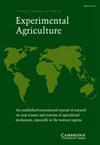Kenyan farmers appreciate the higher yield of 50% non-pollen producing Maize (Zea mays) hybrids
IF 1.9
4区 农林科学
Q1 Agricultural and Biological Sciences
引用次数: 1
Abstract
Summary Incorporating the dominant male sterile gene, Ms44, in new maize varieties results in 50% non-pollen producing (FNP) varieties. This makes the varieties more nitrogen efficient and increases yield directly by an average of 200 kg ha−1 across yield levels. However, as half of the plants do not shed pollen, the presence of Ms44 in an FNP variety is clearly visible. This technology can improve food production and security in the African maize-based agri-food systems, but only if accepted by farmers. Farmers were therefore invited to 11 on-farm, researcher managed trial sites of FNP varieties in Kenya over 2 years. They were asked to identify the traits they find important in evaluating maize varieties and to score the FNP varieties, as well as their conventional counterparts, on these criteria (including yield, resistance to pests, and cob size) and overall, using a five-point hedonic scale. In total, 2,697 farmers participated, of which 62% were women. Farmers mentioned many traits they find important, especially yield and related traits, early maturity, and drought resistance, but also tassel and pollen formation. In 2017, mid-season, participants scored FNP varieties lower than conventional varieties on tassel and pollen formation, indicating that farmers could distinguish the trait. FNP varieties still received higher scores for yield and overall evaluation. In mid-season 2018, participants no longer scored FNP varieties lower for pollen formation as they now understood the technology. In both years, at the end-season evaluation, scores for tassel formation were not different, but participants scored FNP varieties higher for yield and overall. We conclude that farmers recognized the FNP trait but did not mind it as they clearly favored its yield advantage. The FNP technology, therefore, has high potential not only to increase maize yields, food production, and food security in the agricultural systems of Africa but also to increase varietal turnover and the adoption of new, high-yielding, climate-smart maize hybrids.肯尼亚农民欣赏50%不产花粉的玉米杂交种的更高产量
在玉米新品种中引入显性雄性不育基因Ms44,可产生50%的非花粉生产(FNP)品种。这使这些品种的氮效率更高,并在不同的产量水平上直接增加了平均200公斤ha−1的产量。然而,由于一半的植物不脱落花粉,因此在FNP品种中可以清楚地看到Ms44的存在。这项技术可以改善非洲玉米农业粮食系统的粮食生产和安全,但前提是农民接受。因此,农民们被邀请到肯尼亚11个由研究人员管理的FNP品种试验点,为期两年。他们被要求确定他们认为在评估玉米品种时很重要的性状,并根据这些标准(包括产量、对害虫的抗性和玉米芯大小)和总体而言,使用五点特征量表对FNP品种及其传统品种进行评分。总共有2697名农民参加,其中妇女占62%。农民们提到了他们认为重要的许多性状,特别是产量和相关性状、早熟性和抗旱性,还有流苏和花粉的形成。2017年,即季中,参与者在流苏和花粉形成方面对FNP品种的评分低于传统品种,这表明农民可以区分这种特性。FNP品种的产量和综合评价得分仍然较高。2018年季中,参与者在花粉形成方面的得分不再低于FNP品种,因为他们现在了解了这项技术。在这两年的季末评估中,流苏形成的得分没有差异,但参与者对FNP品种的产量和整体得分较高。我们得出的结论是,农民认识到FNP的特点,但并不介意,因为他们显然喜欢它的产量优势。因此,FNP技术不仅在提高非洲农业系统的玉米产量、粮食生产和粮食安全方面具有巨大潜力,而且在提高品种周转率和采用新的高产、气候智能玉米杂交种方面也具有巨大潜力。
本文章由计算机程序翻译,如有差异,请以英文原文为准。
求助全文
约1分钟内获得全文
求助全文
来源期刊

Experimental Agriculture
农林科学-农艺学
CiteScore
2.50
自引率
6.20%
发文量
29
审稿时长
24 months
期刊介绍:
With a focus on the tropical and sub-tropical regions of the world, Experimental Agriculture publishes the results of original research on field, plantation and herbage crops grown for food or feed, or for industrial purposes, and on farming systems, including livestock and people. It reports experimental work designed to explain how crops respond to the environment in biological and physical terms, and on the social and economic issues that may influence the uptake of the results of research by policy makers and farmers, including the role of institutions and partnerships in delivering impact. The journal also publishes accounts and critical discussions of new quantitative and qualitative methods in agricultural and ecosystems research, and of contemporary issues arising in countries where agricultural production needs to develop rapidly. There is a regular book review section and occasional, often invited, reviews of research.
 求助内容:
求助内容: 应助结果提醒方式:
应助结果提醒方式:


